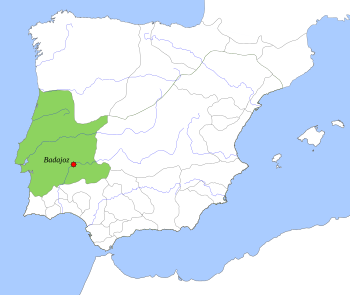Taifa of Badajoz facts for kids
Quick facts for kids
Taifa of Badajoz
طائفة بطليوس (Arabic)
|
|||||||||||
|---|---|---|---|---|---|---|---|---|---|---|---|
| 1009–1150 | |||||||||||

Taifa Kingdom of Badajoz, c. 1037.
|
|||||||||||
| Capital | Batalyaws, currently in the Province of Badajoz, Extremadura, Spain | ||||||||||
| Common languages | Andalusi Arabic, Mozarabic | ||||||||||
| Religion | Islam, Roman Catholicism, Judaism | ||||||||||
| Government | Monarchy | ||||||||||
| Historical era | Middle Ages | ||||||||||
|
• Downfall of Caliphate of Córdoba
|
1009 | ||||||||||
|
• To the Almoravids
|
1094–1144 | ||||||||||
|
• Conquered by the Almohads
|
1150 | ||||||||||
| Currency | Dirham and Dinar | ||||||||||
|
|||||||||||
| Today part of | Portugal Spain |
||||||||||
The Taifa of Badajoz (pronounced TY-fah of Bah-dah-HOZ) was a medieval kingdom. It was an Islamic Moorish kingdom. This kingdom was located in what is now parts of Portugal and Spain. Its main city was Badajoz, which is still an important city today. Badajoz is in the region of Extremadura, Spain.
Contents
History of the Taifa Kingdom
The Taifa of Badajoz began around the early 11th century. It was one of many small kingdoms. These kingdoms appeared after the large Caliphate of Cordoba broke apart. The Caliphate of Cordoba was a big Islamic empire in al-Andalus (parts of Spain and Portugal).
How the Taifa of Badajoz Started
A person named Sabur created the Taifa of Badajoz. His kingdom controlled a large area. This area included cities like Mérida and Lisbon. After Sabur died in 1022, his main advisor, Abdallah ibn al-Aftas, took over. He started a new ruling family called the Aftasid dynasty.
Sabur's sons tried to create their own small kingdom in Lisbon. But Badajoz quickly took back Lisbon.
Changes and Challenges
In 1055, the Taifa of Badajoz became a "tributary" state. This means it had to pay money to the Kingdom of León-Castile. It also lost some of its land south of the Mondego river. Other kingdoms, like the Abbadids of Seville, also took parts of Badajoz's territory.
Battles and New Rulers
After Abdallah's son, Abu Bakr, died, his own sons fought for control. Yahya won this fight. His army joined forces with the Almoravid dynasty. They fought against the Christian army in the Battle of Sagrajas in 1086. This big battle happened close to Badajoz.
Even though the Almoravids won, Yahya worried about their growing power. So, he made an alliance with Alfonso VI of Castile. But in 1094, the Almoravids took over Badajoz. Yahya and two of his sons were killed. Another son escaped and went to Alfonso's court for safety.
The Second Taifa Period
After this, different kingdoms ruled the land of Badajoz. These included the Almoravids, the Almohads, and Portugal. But for a short time, from 1144 to 1150, Badajoz became an independent taifa again. However, it soon fell under the control of the Almohad dynasty.
Rulers of Badajoz
First Taifa Period (11th Century)
- Banu Sabur (Saqlabi)
- Sabur al-Saqlabi (1009-1022)
- Banu Aftas (Aftasids)
- Abdallah ibn Muhammad ibn Maslamah ibn al-Aftas (1022–1044)
- Abu Bakr Muhammad ibn Abdallah al-Aftas (1045–1066)
- Yahya ibn Abu Bakr Muhammad al-Aftas (1067-1073/1079)
- Muhammad ibn Abu Bakr Muhammad al-Aftas (1079-1093)
- The Almoravids took control in 1094.
Second Taifa Period (12th Century)
- Banu Wazir
- Siddray ibn Wazir al-Wazir (1142-1145)
- Banu Hayy
- Muhammad ibn Hakam al-Hayy (1146-1149)
- The Almohads took control in 1150.
See also
 In Spanish: Taifa de Badajoz para niños
In Spanish: Taifa de Badajoz para niños
- List of Sunni Muslim dynasties
 | Stephanie Wilson |
 | Charles Bolden |
 | Ronald McNair |
 | Frederick D. Gregory |

